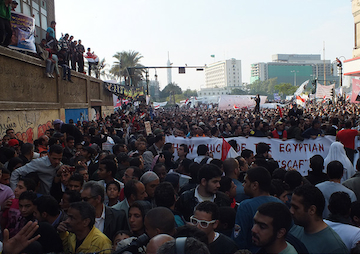Pentagon Tapping In to Social Science to Target Activist Movements
A report published by The Guardian explains how the Minerva Initiative is partnering with universities to militarize social science and better understand the factors behind civil unrest. Protesters in Egypt during the 2011 Arab Spring demonstrations. (Alisdare Hickson / CC 2.0)
Protesters in Egypt during the 2011 Arab Spring demonstrations. (Alisdare Hickson / CC 2.0)
Protesters in Egypt during the 2011 Arab Spring demonstrations. (Alisdare Hickson / CC 2.0)
A June 12 report published by The Guardian exposes what many Americans have long feared: United States military strategists are setting their sights on social movements. The report, written by Nafeez Ahmed, explains how a program under the Department of Defense, the Minerva Initiative, has begun to utilize social science to develop better “operational tools.” Ahmed writes:
The multi-million dollar programme is designed to develop immediate and long-term “warfighter-relevant insights” for senior officials and decision makers in “the defense policy community,” and to inform policy implemented by “combatant commands.” …
Among the projects awarded for the period 2014-2017 is a Cornell University-led study managed by the US Air Force Office of Scientific Research which aims to develop an empirical model “of the dynamics of social movement mobilisation and contagions.” The project will determine “the critical mass (tipping point)” of social [contagions] by studying their “digital traces” in the cases of “the 2011 Egyptian revolution, the 2011 Russian Duma elections, the 2012 Nigerian fuel subsidy crisis and the 2013 Gazi park protests in Turkey.”
Twitter posts and conversations will be examined “to identify individuals mobilised in a social contagion and when they become mobilised.”
Another project awarded this year to the University of Washington “seeks to uncover the conditions under which political movements aimed at large-scale political and economic change originate,” along with their “characteristics and consequences.” The project, managed by the US Army Research Office, focuses on “large-scale movements involving more than 1,000 participants in enduring activity,” and will cover 58 countries in total.
According to its website, the Minerva Initiative, created by the secretary of Defense in 2008, seeks “to define and develop foundational knowledge about sources of present and future conflict with an eye toward better understanding of the political trajectories of key regions of the world.”
Ahmed attempted to contact the initiative’s developers, but received either “bland” responses or no responses at all.
One of the most startling aspects of the initiative is its conflation of peaceful activism with terrorism. “[S]upporters of political violence” are “different from terrorists only in that they do not embark on ‘armed militancy’ themselves,” Ahmed explains. And although university researchers were told that the initiative was a “basic research effort” with no real application, Ahmed cites an email that clearly shows “that DoD is looking to ‘feed results’ into ‘applications.’ ”
RT provides other examples of the Minerva Initiative’s university projects. The University of Washington received $2 million to study children involved in terrorist movements, resulting in a report titled “Understanding the Origin, Characteristics and Implications of Mass Political Movements.” Another project at the University of Denver seeks to understand “instability in middle-income countries” and “the Tunisias and the Libyas and the Ukraines.”
The Social Science Research Council notes potential problems of the project, writing that the initiative “prompts concerns about the appropriate relationship between university-based research programs and the state, especially when research might become a tool of not only governance but also military violence.”
According to its website, some of the areas of focus within the Minerva Initiative are “[s]ocial and political dimensions of beliefs;” “[g]roup-internal narratives and their role in driving strategic priorities;” “[a]nalyses of the topology, power structure, productivity, merging and splitting, and overall resilience of change-driven organizations;” and “[m]echanisms of (and factors inhibiting) mobilization at individual and group levels.”
“Minerva is a prime example of the deeply narrow-minded and self-defeating nature of military ideology,” Ahmed concludes. Read the entire article here.
—Posted by Emma Niles
Your support matters…Independent journalism is under threat and overshadowed by heavily funded mainstream media.
You can help level the playing field. Become a member.
Your tax-deductible contribution keeps us digging beneath the headlines to give you thought-provoking, investigative reporting and analysis that unearths what's really happening- without compromise.
Give today to support our courageous, independent journalists.






You need to be a supporter to comment.
There are currently no responses to this article.
Be the first to respond.